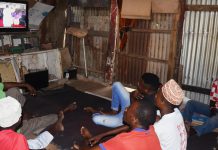AfricaPress-Tanzania: THE Court of Appeal has upheld the life imprisonment sentence imposed on primary school teacher Nelson Onyango for raping his seven-year-old pupil at Tumaini Church building within Butiama District, Mara Region, where he had been conducting private additional tuition.
A panel led by Chief Justice Ibrahim Juma and Justices Gerald Ndika and Mary Levira reached the decision after dismissing the appeal lodged by Onyango, the appellant, to challenge the judgment pronounced by the High Court.
“The High Court rightly upheld the conviction against the appellant. We sustain the enhanced sentence of life imprisonment imposed by the High Court as it is in consonance with the dictates of Section 131 (3) of the Code. In the upshot, the appeal lacks merit. We dismiss it in its entirety,” they declared.
During hearing of the appeal, the appellant alleged that the conviction was based on the weakness of his defence rather than the strength of the prosecution case; That the victim’s evidence was uncorroborated by other evidence and his conviction was anchored on a case that was not proven beyond peradventure.
In determining the appeal, the justices carefully scrutinised the victim’s account and concluded that, like the courts below, it was credible and reliable and that her evidence was direct, explicit and consistent on how the depraved sexual act occurred.
“She was unambiguous that the appellant inserted his manhood into her (secret part) and ejaculated therein. To her credit, she raised the red flag against the appellant at the earliest opportunity by drawing her father’s attention in the evening upon arrival back home around 18:45 hours,” they said.
According to the justices, it is settled that in sexual offence cases, the best evidence is that of the victim who is found to be truthful by the courts.
Besides, they said, the appellant failed to cross-examine the victim further credence to the veracity and cogency of her evidence.
“(Since) the appellant did not contradict the complainant either on her age or the sexual act allegedly committed on her, we would infer that he accepted the narrative that he carnally knew her and that the said victim was of the age of seven years at the material time,” the justices said.
They further pointed out that the victim’s account was sufficiently corroborated by the evidence of her father and the medical findings adduced in court, which were consistent with the victim having been sexually molested.
Such finding too, the justices said, was tenable and sound. Furthermore, they recalled that the appellant complained that he was convicted upon the weakness of his defence as opposed to the strength of the prosecution case.
The justices were, however, quick to point out that in view of the prosecution case they analysed, such criticism is evidently built on quicksand.
They noted that the appellant’s defence, constituted by a general denial of liability interposed with what seemed like an alibi, was duly considered by the trial and first appellate courts but it was rejected.
“We are not surprised that it was rejected; For, general denial is intrinsically weak and self-serving,” they said.
The victim, who was a Class Two pupil at Taharani Primary School, used to attend private additional tuition at Tumaini Church in the village after official school hours up to the evening. The appellant was her tutor there.
In her unsworn evidence, she recounted that on February 12, 2015 at 16:00 hours, she was at the church for tuition as usual.
At the end of the day’s programme, the appellant let all the pupils except her leave for their homes.
Without suspecting what was on the cards, the victim found herself alone with the appellant in the church. Soon thereafter, the appellant closed the door.
He then unzipped his trousers as he was sitting on a chair, removed the victim’s underwear and made her sit on his lap. Finally, he inserted his male member into her private parts and raped her.
After he was through, he opened the door and let her go home. When the girl reached home, she rather disturbingly narrated to her father what had befallen her at the hands of the appellant.
The father took her to Buhemba Police Post where the incident was reported and a PF.3 form issued. The trial court found the victim’s evidence credible and consistent and that it was sufficiently corroborated by the medical evidence.
On that basis, the presiding Resident Magistrate convicted the appellant of the offence and sentenced him to 30 years’ imprisonment.
In addition, he ordered him to pay 2m/- compensation. Subsequently, the appellant’s appeal was dismissed and the sentence was enhanced to life imprisonment.







